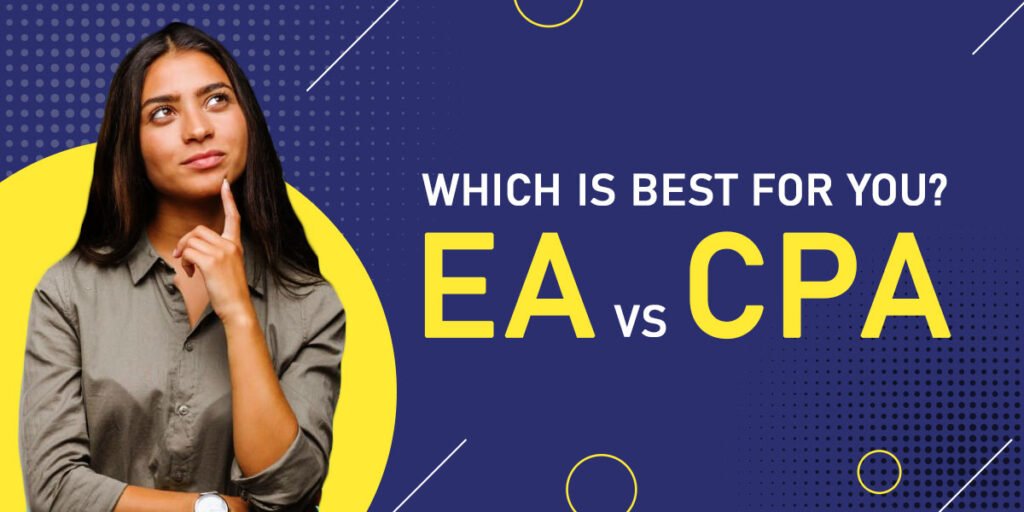EA VS CPA: Which is Best for You?

Candidates who want to build their careers around finance and taxation will have many options to choose from. Each course has its respective advantages and disadvantages in all aspects. With multiple options available, it can be confusing choosing the best career path for yourself.
Courses and certifications especially in taxation will need in-depth knowledge regarding the laws and topics which vary from state to state and country to country. So choosing a course that suits your skills and you are interested in, will be the best way to form a well-rewarding career.
If we compare all the certification options in finance and taxation like CPA (Certified Public Accountant), EA (Enrolled Agent), Attorney, etc, based on the key aspects like salary, recognition, the pass rate of the course, job stability, future career opportunities, we can easily narrow the list and find the one that suits the best.
In this blog, let us compare the two top tier trending courses in finance and taxation, CPA and Enrolled Agent, and find the best suited course for you. Before we go further, it should be noted that both courses have their respective value and neither course is better than the other.
What Is the Difference Between EA And CPA?
An Enrolled Agent is an Individual who gets to represent the taxpayers before the IRS, a United States Federal Agency responsible for the collection of taxes and looking over the proper enforcement of tax laws in the country.
On the contrary, CPA professionals mainly deal with accounting in business and are not involved in strategic and management decision-making.
Here is a brief list of differences between EA and CPA:
| Criteria | EA | CPA |
| Certificate Issuer | Internal Revenue Service (IRS) | American Institute of Certified Public Accountants (AICPA). |
| Eligibility | No Prior eligibility is required. | Graduation or equivalent degree (150 Credits) |
| Course Duration | 6 months to 1 year | 18 months |
| Pass rate | 70% – 74% | 50% |
| Job Titles | Firm Tax Accountant Law Firm StaffTax Analyst Department or Revenue StaffSpecial AgentAppeals OfficerRevenue AgentRevenue officerTax Law Specialist Tax SpecialistSettlement officer | Public AccountantManagement AccountantAccounts ControllerCFOFinance ControllerFinancial Analyst |
| Pattern | Three parts: Part I & Part II & Part III Part 1 – IndividualsPart 2 – BusinessesPart 3 – Representation, Practice, and Procedure | 4 – Part Exam Business Environment and Concepts (BEC)Financial Accounting & Reporting (FAR)Audit & Attestation (AUD)Regulation (REG) |
| Recognition | Global | Global |
What is an Enrolled Agent (EA)?
An enrolled agent is mainly a tax professional whose job role will be mainly focused on managing and maintaining the tax matters of individual clients as well as business firms.
An Enrolled Agent will have in-depth knowledge of the topics of payrolls, estate gifts, returns, inheritance, non-profits, Income, retirement taxes, and levies.
This ordinal privilege is only reserved for Certified Public Accountants (CPA), Attorneys, and to various positions of former IRS employees, and also to candidates who cleared their Special Enrolment Examination (SEE) exam.
Once a candidate clears their EA exam, Internal Revenue Service (IRS) will treat them as a tax specialist. Their day-to-day job role mainly includes the representation of their clients be it large business firms or individual clients in matters of tax appeals, tax audits, and tax collections.
The most familiar career paths that EA professionals tend toward being
- Firm Tax Accountant
- Law Firm Staff
- Tax Analyst
- Department of Revenue Staff
What is CPA?
CPA Stands for Certified Public Accountants and the CPA certification is issued by the State Board of Accountancy. Individual state boards set their CPA exam requirements. Most states will have a similar core set of CPA requirements with minor differences to be eligible for CPA exams.
CPA Professionals will usually be individuals whose credential allows them to practice public accounting duties.
CPAs will also go through the same rigorous process of preparation and testing as EAs to clear their courses and get the certification.
The biggest difference between EA and CPA will be the skill set they possess, CPA skill set will be centred on taxation, auditing, and business accounting activities day to day while a EA’s skill set will be oriented towards strategic decision-making and analysis.
A few common job titles for both EA and CPA professionals are
- Tax accountant
- Tax Planning
- CPA Form Tax Specialist
EA VS CPA: Exam Pattern

EA and CPA exam tests are far from easy to pass, so to clear these tests, aspirants go through rigorous training months before the actual test date.
But with a proper study plan, study material, tools, and knowledge, it will be a piece of cake to clear either the EA or CPA exam.
To get your EA certification or CPA Certification, you have to go through a series of tests besides meeting all the set prerequisites. Let’s first decode the Enrolled Agent exam pattern.
In order to get the Enrolled Agent Certification, candidates must attempt an exam called Special Enrolment Examination (SEE).

The SEE Exam Mainly Consists of 3 Parts:
- Part 1 – Individuals
- Part 2 – Businesses
- Part 3 – Representation, Practice, and Procedure
Each part will have 100 multiple choice type questions based on all the chapters and topics.
SSE exams are conducted throughout the year except in the months of March and April. So, based on your preparation schedule, you can choose the exam dates.
Enrolled Agent Exam Pattern:
All three parts of the SEE exam have 100 questions each and they are in multiple choice type format.
Multiple choice questions are usually in three types:
- Direct question
- All of the following except
- Incomplete sentence
Your score in the exam is calculated based on the number of questions that are answered correctly and the range is converted into a scale of 40 to 130.
CPA Exam Pattern:
CPA Exam is of four-hour duration and has 3 sections to be answered. The three tests in CPA with their respective weightage in the grading are as follows.
| Section | Weightage |
| Multiple Choice Questions (MCQ) | 50 |
| Task-Based Simulations (TBS) & Written Communication Tasks | 50 |
The weightage assigned to particular sections may vary based on the grading board. On the standard, MCQ-type questions are worth 50% of your score, while Task-based simulations and Written Communication Tasks are for the remaining 50%.
EA vs CPA: Exam Syllabus
Enrolled Agent exam chapters and topics designed by Internal Revenue Service. The EA syllabus mainly covers the updated tax laws and practices of different states and countries.
SEE exam mainly tests the candidates based on the Country’s tax codes, forms, and publications updated there for from December 2021.

Enrolled Agent Syllabus 2022:
EA exam has three parts as we already discussed, here is the list of topics of each chapter with their respective weightage.
Part I: Individuals
- Preliminary Work with Taxpayer Data – 14 questions
- Income and Assets – 17 questions
- Deductions and Credits – 17 questions
- Taxation – 15 questions
- Advising the Individual Taxpayers – 11 questions
- Specialized Returns for Individuals – 11 questions
Part II: Business
- Business Entities and Considerations – 30 questions
- Business Tax Preparation – 37 questions
- Specialized Returns and Taxpayers – 18 questions
Part III: Representation, Practices, and Procedures
- Practices and Procedures – 26 questions
- Representation before the IRS – 25 questions
- Specific Areas of Representation – 20 questions
- Filing Process – 14 questions
CPA Exam Syllabus:
The CPA exam is mainly divided into four papers or modules as follows:
Paper-1: Financial Accounting & Reporting (FAR)
- Conceptual Framework, Standard Setting, and Financial Reporting
- State and Local Governments
Paper-2: Auditing & Attestation (AUD)
- Ethics, Professional Responsibilities, and General Principles
- Assessing Risk and Developing a Planned Response
- Performing Further Procedures and Obtaining Evidence
- Forming Conclusions & Reporting
Paper-3: Regulation (REG)
- Business Law
- Individual Federal Taxation
- Property Transaction Federal Taxation
- Entity Federal Taxation
- Professional Responsibilities, Ethics, and Federal Tax Procedures
Paper-4: Business Environment & Concepts (BEC)
- Economic Concepts and Analysis
- Operations Management
- Corporate Governance
- Financial Management
- Information Technology
EA vs CPA: Eligibility
EA course will have the upper hand when it comes to eligibility, there is no prior eligibility requirement. Any candidate with a basic accounting background can apply for the course.
Every state has a separate set of requirements for CPA License issues. A CPA license is issued by the State Board of Accountants. Here is the standard prerequisite for issuing a CPA License.
- Candidates must be a graduate or have an equivalent degree.
- A minimum of 1-2 years of continuous work experience under any CPA.
- 150 semester hours of post-Graduation or college courses for a CPA License.
- Pass the ethics exam.
Salary and Career Opportunities: EA vs CPA

While selecting a job or certification, the main thing people look forward to is their salary, based on the market conditions. EA and CPA are courses or certifications that can offer very good starting salaries which can even go up with increasing experience.
Before we dive into salary details and career opportunities for EA and CPA, let’s look into the job roles available for EA and CPA:
Job Titles of EA:
- Firm Tax Accountant
- Law Firm Staff
- Tax Analyst
- Department of Revenue Staff
Employees from the below-mentioned roles with five years of experience have to fill out a form to undergo a background check and also get their tax transcripts checked to get the Enrolled Agent Credential with the federal license.
- Special Agent
- Appeals Officer
- Revenue Agent
- Revenue officer
- Tax Law Specialist
- Tax Specialist
- Settlement officer
Job Titles of CPA:
- Financial Advisor
- Risk and Compliance Professional
- Internal Auditor
- Corporate Controller
- Tax Compliance
- Personal Financial Advisor
- Finance Director
- Financial Accounting and Reporting
- Public Accountant
EA vs CPA: Course Fees 💰

In the case of the Enrolled Agent exam conducted by the Internal Revenue Service, the total exam fees for all three papers will be USD 609.
Candidates will have to pay an exam fee of USD 203 to register for each part.
As per the rules of the IRS, candidates can take up to four retests in a duration of one year.
Enrolled Agent certification is priced fairly when compared to the other course in finance and taxation.
The average cost for a CPA course
| US CPA Course | Fees |
| Application Fees | USD 170 – USD 225 (Vary from State to State) |
| Evaluation Fees | USD 598 |
| Examination Fees (Per Part) | USD 225 |
| International Testing Fees (4 Part) | USD 1500 |
EA vs CPA: Skill Set

There is a wide difference between the skill sets possessed by EA professionals and CPA professionals. It is vital to consider this difference because skill sets will be the stepping stones when choosing your career path.
Here is the summary of the prime skills of EA professionals:
- Enrolled Agents provide tax bits of advice to their clients and also help with following the tax laws in their states.
- Enrolled Agents speak for their clients on matters of audit and appeals before the Internal Revenue Service (IRS).
- EAs are the tax experts who are engaged in filing tax returns not just for individuals but also for trusts, estates, corporations, and all entities with tax reporting needs.
Summary of the Skillset of a CPA professional:
- Ability to analyze and crunch numbers
- Knowledge of business acumen
- Up-to-date taxation knowledge and skills
- Technical abilities to use finance and accounting software like QuickBooks, Xero, and ERP Systems.
EA vs CPA: Which is best for you?
As we have looked into the basis of both EA and CPA, it is no doubt that both the courses are top-tier and well-qualified. Both of them offer tax-related services to their clients. While EA mainly deals with taxes, a CPA’s part of the job role is taxes.
In short, Enrolled Agents can help you with all your tax matters be it filing, audits and collections, while Certified Public Accountants, along with the role of EA, can also help in financial planning and management.
If you are mainly concentrated on tax and would like to make it a career for your life, an Enrolled Agent will be the best course for you. But if you wish to move around in your career and try working in other jobs like finance analyst, Finance manager and so, CPA should be your option. As it gives you more space around the finance field.





